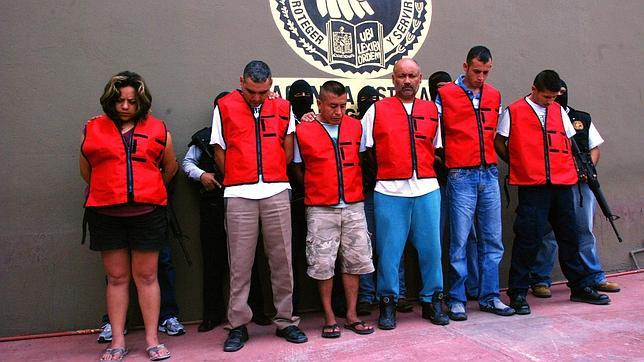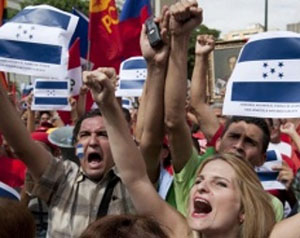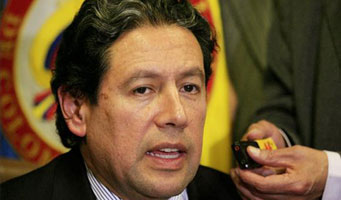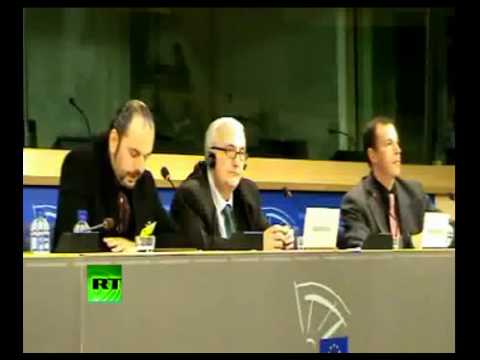South of The Border: The view from Latin America
Politics, South of The Border - Posted on Monday, August 23, 2010 18:05 - 0 Comments
Hondurans take to the streets to demand jobs and increased wages
Thousands of Honduran workers, students and unemployed have launched protests in cities and towns throughout the country, demanding wage increases and rallying against unemployment in the Central American nation. The demonstrations come amid revelations that 50,000 jobs have been lost in Honduras in the last year, on top of 180,000 redundancies in 2009, leading to a crisis in a country already plagued by rampant poverty and enormous wealth disparities. Leonel Bendeck, head of the Centre of Assessment for the Development of Human Rights in Honduras, attributed plummeting employment figures, with the loss of 230,000 jobs in two years, to poor conditions for investment and widespread insecurity following the coup d’état which toppled democratically elected president Manuel Zelaya in June 2009.
Zelaya, a wealthy landowner turned populist leader, had raised the minimum wage in Honduras by 60% prior to being kidnapped in the middle of the night by the Honduran military and flown to Costa Rica. Opponents of the former president cited his decision to hold a referendum on extending the maximum number of terms a president can serve as the motive for the coup. Zelaya has since been replaced by Porfirio Lobo who was elected in November 2009, with many Hondurans boycotting the elections amid strong condemnation from many Latin American countries including Brazil, Argentina and Venezuela, who refuse to recognise Lobo as president. The Obama administration has welcomed the new government, and Lobo publicly thanked U.S. Secretary of State Hilary Clinton at his swearing-in for the support he has received from the United States, with Clinton now aggressively pushing for Honduras’ readmission to the Organization of American States from which it was expelled following Zelaya’s overthrow.
Honduras, a nation of 8 million in which 59% live below the poverty line, is the second poorest country in the Americas after Haiti and is home to countless ‘maquilas’ – textile factories producing apparel for export by multinational companies which take advantage of its basement-level wages and status as a signatory to the CAFTA agreement, under which there are no tariffs on Honduran exports to the United States. Leonel Bendeck noted that textile manufacturing was the one sector in which jobs were still being created in the country. Honduras’ external debt stood at around US$2.3 billion at the end of 2008, equivalent to over 23% of the country’s GDP, forcing the government to make crippling interest payments to foreign creditors which deprive overstretched public services of much-needed capital.
Bendeck recommended the creation of 100,000 temporary jobs to stem the country’s employment crisis, however many have argued that this would increase job insecurity and is not a sustainable long-term solution. Another bone of contention is the proposed Law of Public-Private investment, which Honduran teachers’ unions have denounced as “the privatisation of education by stealth”. Trade unions in the country have condemned the “repressive attitude” of Lobo’s government towards political opponents, and have vowed to maintain the protest until their demands are addressed. Members of the National Front for Popular Resistance (FNRP) and trade union leaders have warned that a national strike will be called in the near future if the government does not grant significant wage increases and repay a multimillion dollar debt, thought to stand at over US$200 million, owed to the teachers’ union. Hundreds of baton-wielding police deployed tear gas and beat protesters who had blocked two roads in the capital Tegucigalpa on Friday, detaining more than 20 people and leaving dozens injured.
FNRP members and representatives from other similar organisations have reported receiving death threats from government officials, purportedly working in concert with organised criminal gangs, and have described the situation in the country as “critical”. On Friday, a mass grave containing the corpses of over 100 political dissidents who have gone missing in the last three months was discovered in Honduras.
Colombian court sends plans for U.S. bases back to the drawing board
The Constitutional Court of Colombia ruled on Tuesday that an accord signed in October 2009 between the government of former president Álvaro Uribe and the Obama administration, granting the U.S. military and intelligence agencies access to seven military bases on Colombian soil, must gain congressional approval. The court’s president, Mauricio González, ruled that the deal must be revised by new president Juan Manuel Santos prior to being submitted to Colombia’s congress for approval. Uribe had cited reasons of “national security” for bypassing congress when the announcement was originally made last year, a move which the court ruled a violation of the country’s constitution. González remarked that the “authorisation for foreigners to carry and use arms” carries with it “new obligations for the Colombian state”, citing this as the principal reason for forcing the issue before congress and granting the government a time limit of one year to get the legislation passed. The United States maintains that the bases are necessary to assist in the fight against drug trafficking and terrorism.
Colombian activist groups said they would be campaigning vigorously against the ratification of the agreement, with Lilian Solano of the Life and Justice Movement affirming that “if they have given the government one year then we have one year to let the world know that the last thing we need is these U.S. military bases”. The agreement to station U.S. troops on the ground in Colombia drew sharp criticism from many South American leaders when it was made public in late 2009. Venezuelan president Hugo Chávez called it a “permanent, 24-hour danger”, with Bolivian leader Evo Morales calling the announcement “a risk to peace between nations” in South America. The seven bases are all located in the east of Colombia, close to the 1,400 mile-long border with Venezuela. Morales welcomed the court’s announcement this week, calling it “an open defence of the dignity and sovereignty” of the Colombian people. The Bolivian president said the U.S. was using the issues of drug trafficking and terrorism as a pretext to intervene in sovereign nations in order to “keep stealing their natural resources”.
Colombia is the United States’ strongest ally in South America, and under the Plan Colombia agreement has received US$7 billion in U.S. taxpayer money since 1999, with the vast majority earmarked for military hardware and so-called ‘anti-drug operations’. This has coincided with innumerable accusations that the Colombian military and paramilitary groups given tacit support by the government have been responsible for committing atrocious human rights abuses against peasants and political opponents in rural areas of the country. There is also widespread suspicion about the real motives for the United States government’s presence in Colombia. A UN report released in June 2008 revealed that coca production in Colombia was on the rise, and had increased by 27% in the period between 2006 and 2007. In September 2007, a plane which both the European Parliament and the United States Federal Aviation Administration confirmed had been used “several times” by the CIA to transport prisoners to the U.S. detention facility at Guantánamo Bay, Cuba crash-landed in the Yucatán peninsula in southern Mexico containing a shipment of around 3.3 tons of Colombian cocaine.
Six Mexican police officers arrested following kidnap and murder of mayor
 Mexican authorities announced on Friday that six police officers had been arrested on suspicion of participation in the kidnap and murder of Edelmiro Cavazos, mayor of the town of Santiago in the north-eastern state of Nuevo León. Some of the officers are accused of having kept watch to ensure no other law enforcement officials witnessed the kidnap, which took place at Cavazos’ home on Sunday evening, while others are accused of direct participation in the crime. Among those detained are individuals who had been on duty guarding the mayor’s house at the time of his kidnapping, and all six arrestees have confessed their guilt. Cavazos was found dead on a rural stretch of highway three days after being sequestered. At least four other people are suspected of involvement in the crime.
Mexican authorities announced on Friday that six police officers had been arrested on suspicion of participation in the kidnap and murder of Edelmiro Cavazos, mayor of the town of Santiago in the north-eastern state of Nuevo León. Some of the officers are accused of having kept watch to ensure no other law enforcement officials witnessed the kidnap, which took place at Cavazos’ home on Sunday evening, while others are accused of direct participation in the crime. Among those detained are individuals who had been on duty guarding the mayor’s house at the time of his kidnapping, and all six arrestees have confessed their guilt. Cavazos was found dead on a rural stretch of highway three days after being sequestered. At least four other people are suspected of involvement in the crime.
State authorities informed the press that the mayor, a member of the Felipe Calderón’s ruling National Action Party (PAN), had become a target for drug cartels operating in the region due to his efforts to root out corruption in the town’s police force. Police corruption is routine in much of Mexico, with many officers receiving money from drug cartels in return for immunity from prosecution and on the understanding that law enforcement officials will pursue rival gangs. Drug-related violence has been escalating in the border state of Nuevo León – home to Monterrey, Mexico’s third largest and wealthiest city – in recent years, as rival cartels compete for access to lucrative trade routes into nearby Texas.
President Calderón told an anti-narcotics forum on Thursday that the United States government is not doing enough to stop the flow of illegal arms into Mexico, and said that “public opinion must be mobilised internationally to criticise the irresponsibility” of the U.S. arms industry, which he accused of “fomenting the violence” south of the border. Calderón said that “selling arms to criminals” is big business in the United States, the world’s largest arms manufacturer, and accused the industry of exasperating conflicts throughout the globe.
Fidel shines a light on secretive Bilderberg Group
Cuban revolutionary leader Fidel Castro this week published three articles calling attention to the existence of a “global government in the shadows” and issued a warning that “the war against Iran has already been decided by the higher circles of the empire”. Castro, who has long warned of an impending conflict with the Persian state, observed that “only an extraordinary effort of world opinion” can halt a war that former CIA chief Michael Hayden three weeks ago described as “inexorable”. On Monday the former Cuban president used his column, “Reflections from Fidel”, published at regular intervals in the Cuban state-run press, to reproduce an article by Cubavisión television presenter Randy Alonso printed earlier this year entitled “The so-called world government meets in Barcelona”, a reference to the Bilderberg Group’s annual meeting, held in May 2010 at the Dolce Hotel in Sitges on the outskirts of the Catalan capital.
Alonso’s article gives an outline of the group’s history and prowess, noting that many former presidents and prime ministers of nations such as the United States and United Kingdom have attended Bilderberg meetings prior to election to their countries’ highest offices, rubbing shoulders with leading lights from the world of finance and media, along with executives of the world’s largest corporations. “Did our readers know this?” asks Fidel of the revelations contained in Alonso’s piece, “has any major television network or newspaper said a word? Can any of them deny that these systematic meetings of the world’s most powerful financiers take place every year?” Castro carries on this rhetorical line of questioning, demanding, “Who hides the truth? Who misleads who? Who lies? Can any of what has been written here be refuted?”
Two subsequent columns, published by the former Cuban president on Wednesday and Thursday and entitled “The World Government, Parts 1 & 2”, are comprised of extracts from Spanish author Daniel Estulin’s 2006 book “The Secrets of Club Bilderberg”, personally selected by Castro. The 84-year-old revolutionary leader calls the book “fabulous”, saying that it “cuts… magnates in the fields of politics and finance” such as “Henry Kissinger, George Osborne, the directors of Goldman Sachs” and others “to shreds”. Castro goes on to refer to the group as “odious”, commenting on the findings documented by Estulin that it is “terrible to think that that the intelligence and feelings of the children and youth of the United States are mutilated in this way” and concluding that “´they must fight in order to avoid being dragged into a nuclear holocaust, and to recover what is left of their physical and mental health”. Castro has invited Estulin, who he describes as “honest and well-informed”, to Havana for a private meeting. Earlier this year the Spanish author gave a presentation on his findings regarding the group to the European Parliament.
Castro also used his Monday column to attack the “absurd” decision to appoint former Colombian president Álvaro Uribe to the position of vice president of the UN commission investigating Israel’s murderous attack on the Gaza aid flotilla, opining that Secretary General Ban Ki-Moon was “complying with orders from above” and noting that the attack took place “in international waters, a considerable distance from the coast”. “As if a country full of mass graves containing the corpses of murder victims, some holding up to 2,000, and seven Yankee military bases, along with all the Colombian bases at its service, doesn’t have anything to do with terrorism and genocide”, scoffed the former Cuban leader.
In Brief:
Colombia: President of the Colombian Congress Armando Benedetti stated in an interview with teleSUR conducted in Caracas on Sunday that he believes last week’s car bombing in Bogotá to be the work of extreme right-wing terror groups within the country wishing to send a message to new president Juan Manuel Santos. “This is how they operate”, said Benedetti, who dismissed any link between the attack and the restoration of diplomatic ties with Venezuela but admitted that “it is difficult to hypothesise”.
Bolivia: Negotiations between the government and protesters in Potosí showed signs of improvement after an agreement was reached to build an international airport and state-owned cement factory in the departmental capital and to finish construction of a new highway linking Potosí with the department of Tarija. Celestino Condori, head of the Civic Committee of Potosí, said that progress was also being made in the department’s dispute with neighbouring Oruro over access to mineral deposits. Road blocks which had frozen any transport into or out of Potosí for over two weeks have been lifted.
Chile: On Wednesday at least 66 students were arrested at a demonstration in Santiago called in order to demand greater investment in state education and “a halt to the privatising agenda” of President Sebastián Piñera’s government. Traffic was suspended in the area surrounding the unauthorised protest, and police used tear gas and water cannons to disperse thousands of demonstrators. The majority of the arrests were made when some protesters attempted to march to the presidential palace in the centre of the nation’s capital.
Venezuela: The government of Hugo Chávez announced on Wednesday that it will support a Serbian UN resolution calling on the international body to guarantee the Balkan state’s sovereignty and territorial integrity, in defence of Serbia’s “history, dignity and justice”. When the breakaway province of Kosovo declared independence from Serbia in 2008, Chávez said the Venezuelan government would join Russia, China, Spain and others in not recognising the new state. He denounced the move as an “extremely dangerous precedent for the whole world”, charging that the United States was responsible for stirring up trouble in the region in a bid to undermine Russia’s influence.
Tom Kavanagh, a writer and activist based in Argentina, is Latin America correspondent for Ceasefire. His column on Latin American affairs appears every Monday.





Leave a Reply